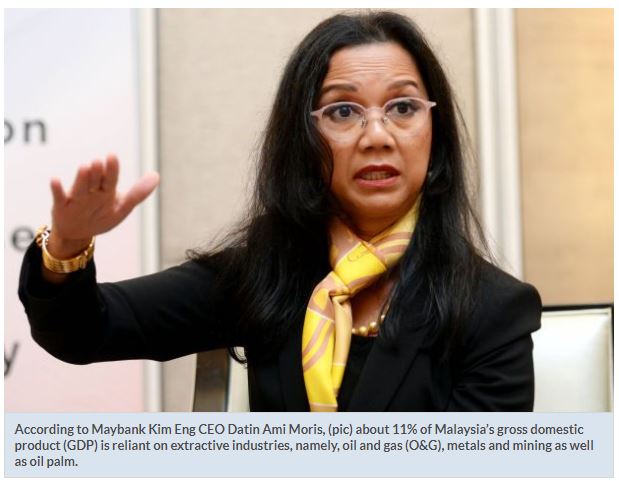Malaysia’s high carbon dependence raises ESG risks
PETALING JAYA: Malaysia is highly dependent on carbon-intensive industries and this poses growing risks to the country’s aim to embrace environmental, social and corporate governance (ESG) standards.
As more international funds are factoring in sustainability and societal impact as part of their investment decisions, the government and businesses in Malaysia will need to speed up the adoption of ESG standards to appeal to global investors.
According to Maybank Kim Eng CEO Datin Ami Moris, (pic) about 11% of Malaysia’s gross domestic product (GDP) is reliant on extractive industries, namely, oil and gas (O&G), metals and mining as well as oil palm.
“Transitioning to net zero carbon from such industries will require significant policies, capital investments and disruptions to employment.
“The question to corporations such as Petroliam Nasional Bhd (Petronas) would be how they will manage the transition and their capital expenditure priorities, ” she said.
For context, national oil producer Petronas has pledged to achieve net zero carbon emissions by 2050.
Apart from the high carbon O&G industry, Ami said the country’s power sector is another risk to ESG adoption.
She pointed out that as of 2018, about 43% of Malaysia’s power generation was based on coal and this is only expected to decline to below 30% after 2032.
This as a result would cause Malaysia’s power producers to be at risk of international agreement targets, rising insurance premiums and possible carbon taxes.
“Tenaga Nasional Bhd , with over 60% of its power generation mix based on coal, has seen foreign investors exiting from its stock since 2016.
, with over 60% of its power generation mix based on coal, has seen foreign investors exiting from its stock since 2016.
“They had then held 29% of equity in the company but today it is at a record low of 13%, ” she said.
Ami was speaking during the first day of the IDEAS Malaysia Outlook Conference 2021 yesterday.
Meanwhile, Razeen Sally, a visiting associate professor at the Lee Kuan Yew School of Public Policy, spoke on the global economic outlook post-Covid-19.
While Razeen believes the global economy will rebound in 2021, he said the recovery will be divergent across developing and advanced economies, judging from the estimates of the International Monetary Fund.
Among the advanced economies, he said the United States and Japan experienced lower economic contraction than the average in 2020, but are expected to have a faster rebound than the average this year.
Across the emerging markets and developing economies, China is projected to see a steeper recovery in 2021 than the average, despite the fact that the country felt a smaller hit to its economy in 2020 as it came out of lockdown earlier than other countries.
Razeen noted that the massive policy responses undertaken by respective governments through fiscal and monetary measures have helped the global economies to recover.
In the case of Malaysia, he said the country’s total fiscal stimulus value to GDP was the third largest among key Asian economies, only behind Singapore and South Korea.
Looking ahead on the regional economic outlook, Razeen raised concerns about the medium-term future of Malaysia and Thailand as both economies remain stuck in the middle-income trap.
“Upper middle-income countries, more so in the case of Malaysia than Thailand, are squeezed because they do not have the innovation capacity of advanced countries but they can’t compete on labour cost with countries below them on the development ladder.
“Politics and governance are also really dragging their adaptation capacity to graduate from the middle-income trap and perhaps, the Covid-19 crisis makes the features more pronounced than they were before, ” he said.
Source: https://www.thestar.com.my/business/business-news/2021/02/03/malaysia039s-high-carbon-dependence-raises-esg-risks


 English
English




